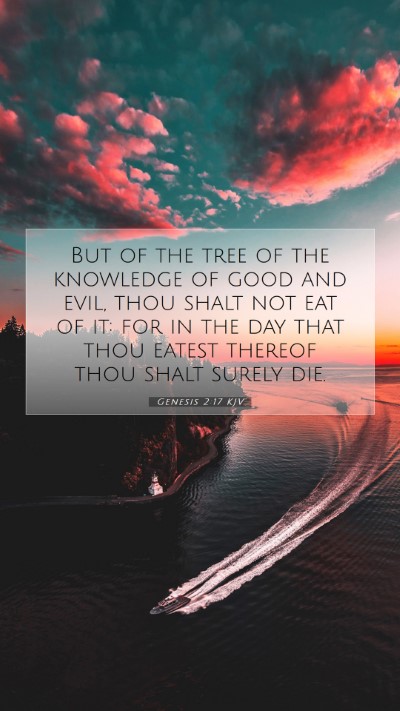Understanding Genesis 2:17
Bible Verse: Genesis 2:17 - "But of the tree of the knowledge of good and evil, thou shalt not eat of it: for in the day that thou eatest thereof thou shalt surely die."
Introduction
Genesis 2:17 stands as a pivotal verse in the biblical narrative, encapsulating the divine command given to Adam regarding the tree of the knowledge of good and evil. This verse invites deep reflection on themes such as obedience, free will, and the implications of sin. To aid in exploring the meaning of this verse, we will draw insights from renowned public domain commentaries.
Bible Verse Meanings and Interpretations
- Divine Command: The command not to eat from the tree signifies God's authority and the expectation of obedience from His creation. Adam's adherence to this command illustrates a relationship built on trust and fidelity.
- Knowledge of Good and Evil: The tree symbolizes profound wisdom and moral discernment. In refraining from eating, Adam and Eve acknowledge their dependence on God for knowledge and ethical understanding.
- The Consequence of Disobedience: The warning of death serves as a serious admonition. This death symbolizes not merely physical demise but spiritual separation from God, emphasizing the gravity of their choice.
Insights from Public Domain Commentaries
Matthew Henry's Commentary
According to Matthew Henry, the prohibition against eating from the tree reflects God's desire to test humankind's obedience and loyalty. The verse serves as a reflection of God's sovereignty over creation and the importance of boundaries set by divine authority. Henry emphasizes the significance of obedience as the foundation of human existence and relationship with God.
Albert Barnes' Notes on the Bible
Albert Barnes highlights that the term "knowledge of good and evil" denotes a moral maturity and the ability to discern right from wrong. Barnes asserts that by eating from this tree, Adam would seek autonomy and self-governance, attempting to replace divine wisdom with his own understanding. This act would ultimately lead to a rupture in the harmonious relationship between God and humanity.
Adam Clarke's Commentary
Adam Clarke elaborates on the nature of death mentioned in this verse, indicating that it not only refers to physical death but also the spiritual death that results from sin. Clarke points out that this warning underscores the seriousness of transgressing God's command, with far-reaching consequences for all humanity.
In-Depth Analysis
The verse serves as a critical juncture in the biblical narrative. The prohibition imposed creates an environment of moral choice that is essential for true obedience. By having the option to follow or defy God's command, humanity's free will is highlighted.
Theological Implications
- Free Will: This passage introduces the concept of free will, as Adam and Eve are given the choice to obey or rebel against God's command.
- Sovereignty of God: It reaffirms God's authority over creation, establishing Him as the ultimate source of moral law.
- Consequences of Sin: The warning of death foreshadows the disruption in the relationship between God and humanity that will occur as a result of disobedience.
Application to Daily Life
Understanding Genesis 2:17 transcends its historical context and offers valuable lessons for contemporary believers:
- Respecting Boundaries: Just as Adam was instructed, we too are called to honor divine commands and the boundaries set in our own lives.
- Seeking Divine Wisdom: Rather than seeking knowledge independent of God, believers are encouraged to rely on His guidance in moral and ethical decisions.
- Understanding Consequences: Recognizing the seriousness of our choices and their potential consequences encourages a life aligned with God's purposes.
Cross References
- Genesis 3:6: The account of Eve's decision to eat from the tree, leading to the fall of mankind.
- Romans 5:12: The introduction of sin into the world through Adam's transgression.
- James 1:15: The progression of sin leading to death, mirroring the consequences outlined in Genesis 2:17.
Conclusion
Genesis 2:17 serves as a foundational verse that not only addresses the nature of God's command but also the implications of human choice. Insights from biblical commentaries deepen our understanding of the gravity of this command and its relevance to our lives today. Through the analysis of this verse, we are reminded to seek God's wisdom, respect His boundaries, and recognize the serious nature of our life choices in correlation with divine authority.


